Hi friends! And if you are one of my 40-ish new subscribers, welcome! To quickly re-introduce myself for those of you who just found me: hi, I’m Sam. I’m an American expat in Cairo. I write essays about everything that is weird, wonderful, difficult, and enlightening about travel and life abroad.
You all had excellent thoughts on my last post about why we shouldn’t try to travel like “locals.”
posted a thought-provoking response about how traveling meaningfully and bringing the spirit of travel to our everyday lives requires deep self-knowledge. I also really appreciated this take from about rejecting the label of “tourist” vs. “traveler” vs. “local”—After six years of nomading, I no longer try to put a name on it. I'm just me doing my thing and having my experiences and meeting the people I do and then writing about it.
Today’s essay is about my recent roadtrip in Cyprus, but it’s also not really about that at all. Read on and you’ll see what I mean. I was going to write some pretty platitudes about what a wonderful trip we had—about the liberation of flying down the open road with the windows rolled down to let in the ocean breeze—but something about it kept nagging at me, so I’m going to tell you what’s on my mind.
One last note: if you’re enjoying this newsletter, please consider upgrading to a paid subscription. So far, paid subscribers have received tours of Nefertari’s tomb and an outdoor sculpture museum in Cyprus; original cocktail recipes; and links to some of the best travel writing on the internet. I am thrilled to have you here and will continue to publish free essays either way, but I take each paid subscription as a nudge to keep going.
Have a wonderful weekend,
Sam
Joan Didion, with whom I have a love-hate relationship (a relationship I suspect she, much like my third grade boyfriend, never really knew about) once said we tell ourselves stories to live. I believe in this deeply. Stories bring order to the chaos and randomness of human experience; they extract sense from nonsense. But what happens when our old stories no longer serve us?
***
Here is a story I was told that turned out to be bullshit: when you lose someone, the anniversaries will be difficult. The one-year mark would be the hardest, people said. It would be a sort of coda, the end of a grace period unspoken and undefined, after which my friends would no longer excuse my crying in public and slipping away at parties with pitying whispers of “remember her dad just died.” Because of this, I remembered the exact date and time my father’s eyes closed forever, and held onto it like a mantra: April 22, 2022, 10:15 p.m.
April 22, 2023 happened to fall during Eid. I dreaded it, and about a month prior, I told Nick it was imperative that we get the hell out of here for that holiday weekend. I’d been living hard for months, trying to outrun grief by traveling constantly, voraciously consuming cities and cultures to fill the emptiness. Athens. Munich. The Maldives. Vienna. Luxor. Aswan. My journeys were stories I could make sense of, with a clear beginning, middle, and end, full of places to go, sights to see, items to check off the bucket list. I couldn’t let up now, at this critical inflection point—no, another trip was all I needed. We would cross the rubicon while my focus was elsewhere, and I’d come home ready to face the new world. I started looking for cheap tickets to anywhere.
I found that it would take just over an hour to fly direct from Cairo to Larnaca, a sleepy seaside town in Cyprus. I knew nothing about it other than it was a Mediterranean island where there would be sunshine and pretty water, which was all I really cared about. Cursory research reveled Cyprus’s history to be one of conquest and adventure; it had once been a stop for 12th century crusaders on their way to the Holy Land, and there was some sort of “cyclops cave”—which I assumed was the backdrop that inspired the chapter in the Odyssey where Odysseus blinds and tricks the one-eyed monster to save his intrepid crew.
I hoped I’d have an adventure there, too. I was on a mission to forget the timeline I was living in, and Cyprus would provide me another one to occupy.
***
Our plane landed in Cyprus at twilight. The Republic of Cyprus, that is—Larnaca is on the “Greek” side that occupies about two-thirds of the island, as opposed to the Turkish Republic of Northern Cyprus, which makes up the other third. Because public transportation is scarce in Cyprus, Nick and I had decided to make it a road trip, and we picked up a Nissan Note so small and light you’d think the body was made of tin foil. As I pulled out of the rental lot and onto the two-lane highway, I stuck the gas pedal to the floor and watched as trucks and minivans flew past us. If my dad could have see me, he would have laughed his boisterous, squawking laugh. The Note made a Prius look like a Formula One car, and he constantly joked that Priuses were the most anemic vehicles ever produced. I almost cracked a smile, but resolved to put him out of my mind. On the edge of town, a causeway took us over a salt lake, where a little flock of flamingos stood in the shallows just beyond the railing, the water reflecting the last streaks of sunset.
Morning in Larnaca revealed a provincial charm, with its brightly painted doors and shutters. Water tanks lined the buildings’ roofs. Just around the corner from our hotel was a museum of salt and pepper shakers. Nick and I sipped our morning coffee in the main square, near the 1200-year-old Church of Saint Lazarus made of rough-hewn limestone and terracotta.
It was clear our walk to breakfast had shown us most of what there was to see in Larnaca. We settled on driving north to Nicosia, whose reputation as “the last divided capital” intrigued us—it straddles the island’s Greek and Turkish sides, a UN-controlled demilitarized zone dubbed the “Green Line” running through the heart of the city and cleaving it in half. We’d been told that you feel like you are in another country immediately after stepping over the Green Line, and the temptation to cross was irresistible, even if only for the story.
I looked out at the land as we flew down the highway and it felt like home to me. The dry-brush valleys and rocky shoreline looked so much like Northern California, where my father’s roots ran deep. It was a warm, clear morning—the sort he would spend washing his Mustang until it shined so brightly you had to squint to look at it and then stretch out his legs in the backyard, fingers interlaced behind his head like a headrest as he looked up at the cloudless blue sky, asking why he’d ever want to live anywhere else.
***
Nicosia was a ghost town when we arrived. Everything was shuttered and hushed, the city still asleep at 11:00 a.m. We were the only tourists save for a couple buses of German retirees, who milled about aimlessly; it appeared we had all come here under the same assumption that there would be something to do in the Cypriot capital, and we were quickly realizing there wasn’t much. Nick had found a website with a do-it-yourself walking tour of the main attractions—the 16th century city walls, the monuments, the museums—and we completed the circuit in little over an hour. The only thing left was to cross to the Turkish side, so we walked to the checkpoint at the end of Ledra Street.
I often think about the arbitrariness of borders—probably because I study war, and if anything will show you just how ephemeral the lines on a map are, it is examining humans’ eternal damnation to clobber each other over finite resources—but this border seemed like of the most arbitrary of all. The checkpoint was in the center of a mid-market shopping district, indistinguishable from that of any other European town, with shoe stores and ice cream shops and windows full of fake Hermes handbags. There were no guns, no “YOU ARE NOW LEAVING…” signs to herald our exit, just a dead end on an unremarkable boulevard.
There was a cordoned line in front of the guard booth, and Nick and I stepped up to it as though buying tickets at a movie theatre. We slid our passports into the little metal tray under the window. The border guard, whose name was Giorgios something or other, handed them back without stamping them (the Republic of Cyprus believes the entire island is rightfully theirs, and to give us an exit stamp would be a formal admission that we were leaving their territory) and waved us on.
For the next fifty feet or so, we were in limbo. UN officials, who supposedly control the liminal space between the two Cypruses, were nowhere to be found. I thought about who would have jurisdiction if someone was murdered here, or what would happen if you lost your passport and the border guard who just checked it didn’t recognize you and refused to let you back in. Most of all, I thought about another threshold, that one-year anniversary I’d come here to forget. The metaphor felt almost too obvious.
A few seconds later, we were at the Turkish side’s entry point. A border guard named Mehmet something something, who looked basically the same as Giorgios, again checked our passports and again did not stamp them. We stepped onto the other side.
It was as though we’d never crossed a border at all. The only differences were the languages on the street signs and the flags flown from the balconies. Northern Nicosia appeared a little poorer on the whole, but the architecture was the same, the flowers were the same, and the same sun-faded goods sat forlorn in the windows of the same cheap, dated shops. Just like the Greek side, the streets were quiet—so quiet Nick and I kept asking each other if this was some sort of Potemkin village where no one actually lived.
After wandering a few blocks and into a caravanserai, whose shops and restaurants were padlocked and dark, we got back in the car. We spent the rest of the afternoon driving east, where we hiked over jagged sea cliffs with tide pools covered in films of crystallized salt.
***
The next day—April 22—we drove through the foothills of the Troodos Mountains toward the island’s western reaches. We planned to stop in Paphos, said to be the birthplace of the goddess Aphrodite, the catalyst for Trojan War and The Iliad. We had crouched our way through the cyclops cave the day before, and this would complete our sightseeing tour of Homer’s works. The drive lent itself to deep conversation—everyone is more open when they don’t have to look their interlocutor in the eyes and can instead stare forward at the open road—and perhaps because we were in the land of mythology and epics, our talk meandered to the differences in structure between sci fi and fantasy.
“The defining feature of fantasy is the quest,” I said. “I mean, good stories in every genre have some sort of implicit quest. But in fantasy, it’s usually very explicit. Destroy the ring. Defeat Voldemort. That sort of thing.”
“True,” Nick said. Then he uttered a phrase that walloped me: “The quest itself is the real fantasy. I’d rather have a clear, simple goal and know what I have to do—even if achieving it is almost impossible—than face the nothingness of reality.”
He had, unwittingly, held a mirror up to me. I had brought us to Cyprus to avoid facing a lifetime devoid of someone I loved, but my quest was a delusion. I was not a hero and this was not an epic tale, and we would eventually go home and my dad would still be exactly as dead as he was now.
It was a freeing thought. If there was no real quest, there were no real rules, and we could drift however we pleased. We floated from Paphos, with its exquisite mosaics from antiquity, to Lefkara, a tiny, traditional village where we stuffed ourselves on souvlaki and fried celery leaves and cheeses wrapped in phyllo dough. Funnily enough, we later learned that the cyclops cave was fake. No part of the Odyssey was set in Cyprus, but it was a beautiful hike anyway.
***
On our last day, as we sat in the hotel courtyard eating breakfast, I got a text from my mom. It said:
7 more minutes
I looked at the clock: 8:08 a.m. California was 10 hours behind Cyprus, meaning it was still April 22 there, 10:08 p.m. We hadn’t crossed the threshold yet. The moment I’d come to avoid was here.
“Are you okay?” Nick asked.
I wanted to say no because that’s what was expected of me—a flood of tears, an emotional release. I contemplated making a scene just to end the mourning period with a bang. But why, when my father’s death was already permanent? It felt no different than crossing the Green Line in Nicosia. I had long since been exiled to this island of loss, and it didn’t matter which side of it I was on. The moment had no significance at all. The clock struck 10:15, and a weight lifted.
“Yes,” I finally answered. “My dad’s either here or he’s not. He is no more gone today than yesterday or tomorrow.”
We took a walk through town before leaving for the airport, wandering with no objective. An orthodox mass was being projected into the square from the Church of Saint Lazarus, a rich, bass singing voice rising and falling in minor tones both ominous and compelling. I thought of the return home, and how nothing about the story would have changed but my own rejection of it. I would go on smiling when I wanted and crying when I must, because the quest is a fantasy, and the border is arbitrary.


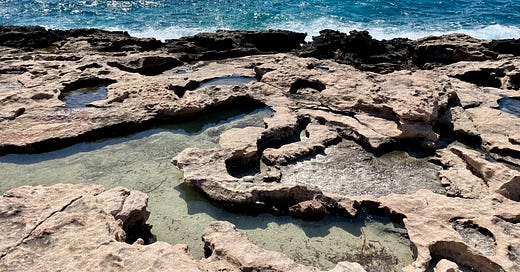


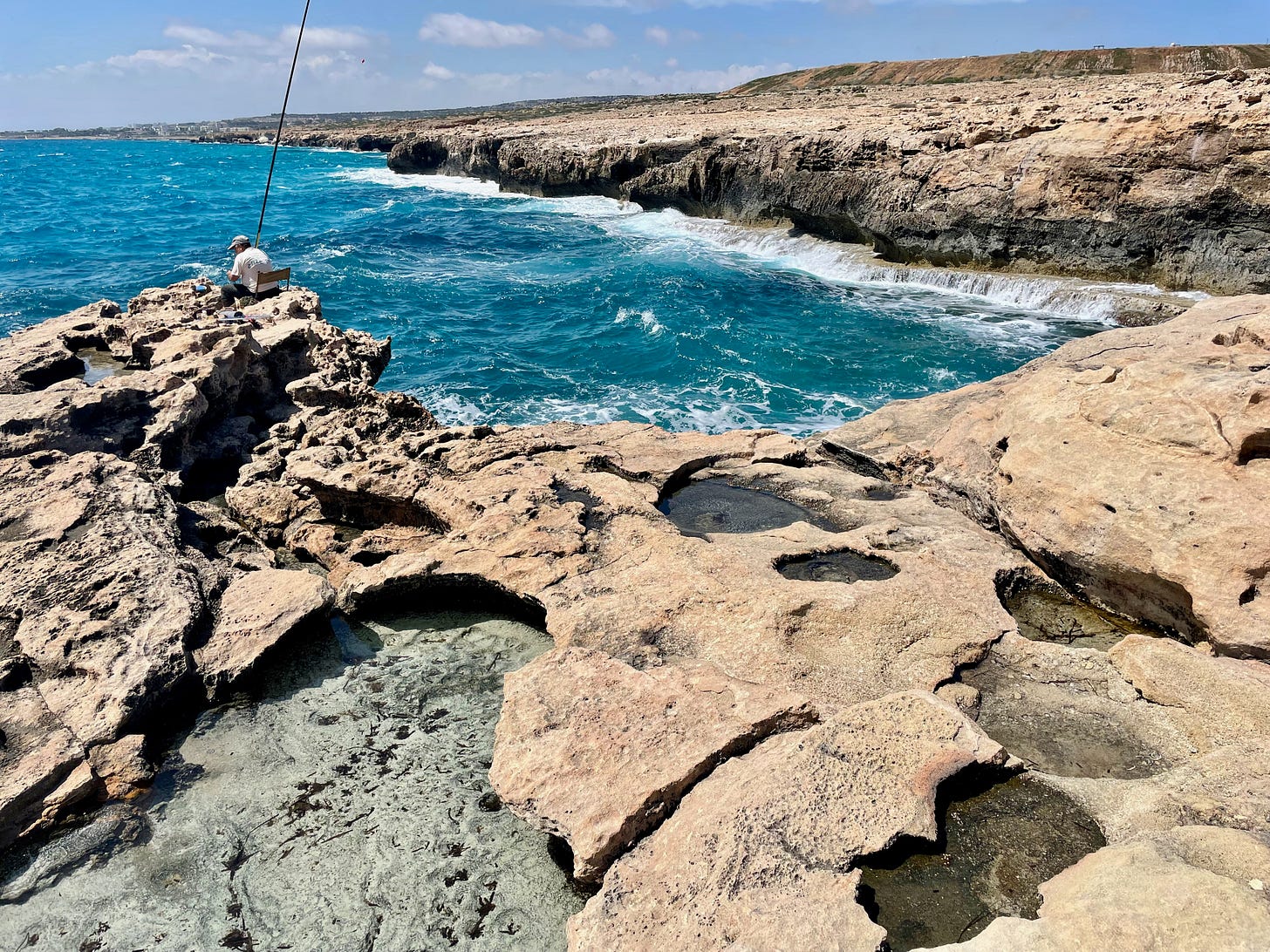
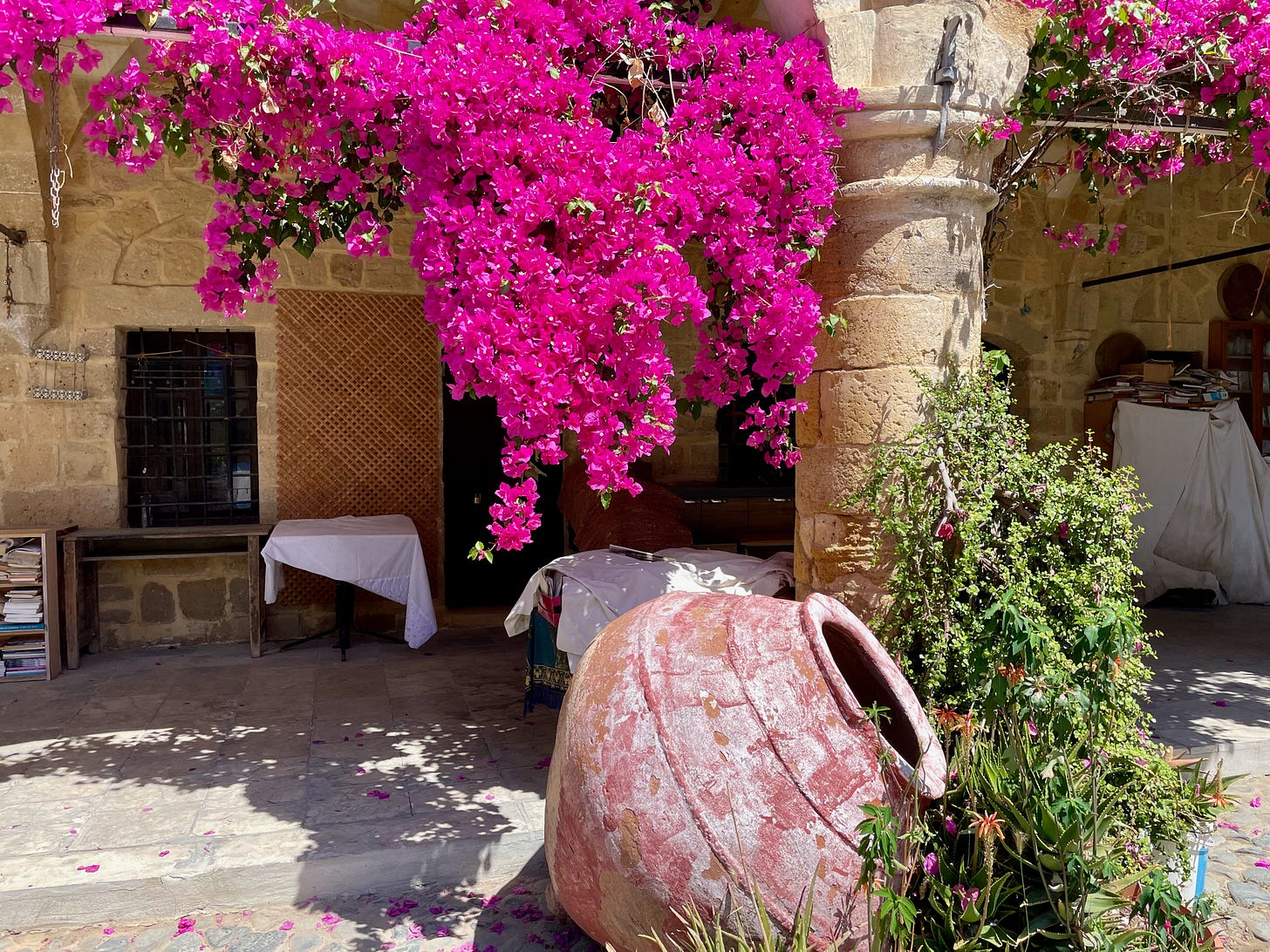


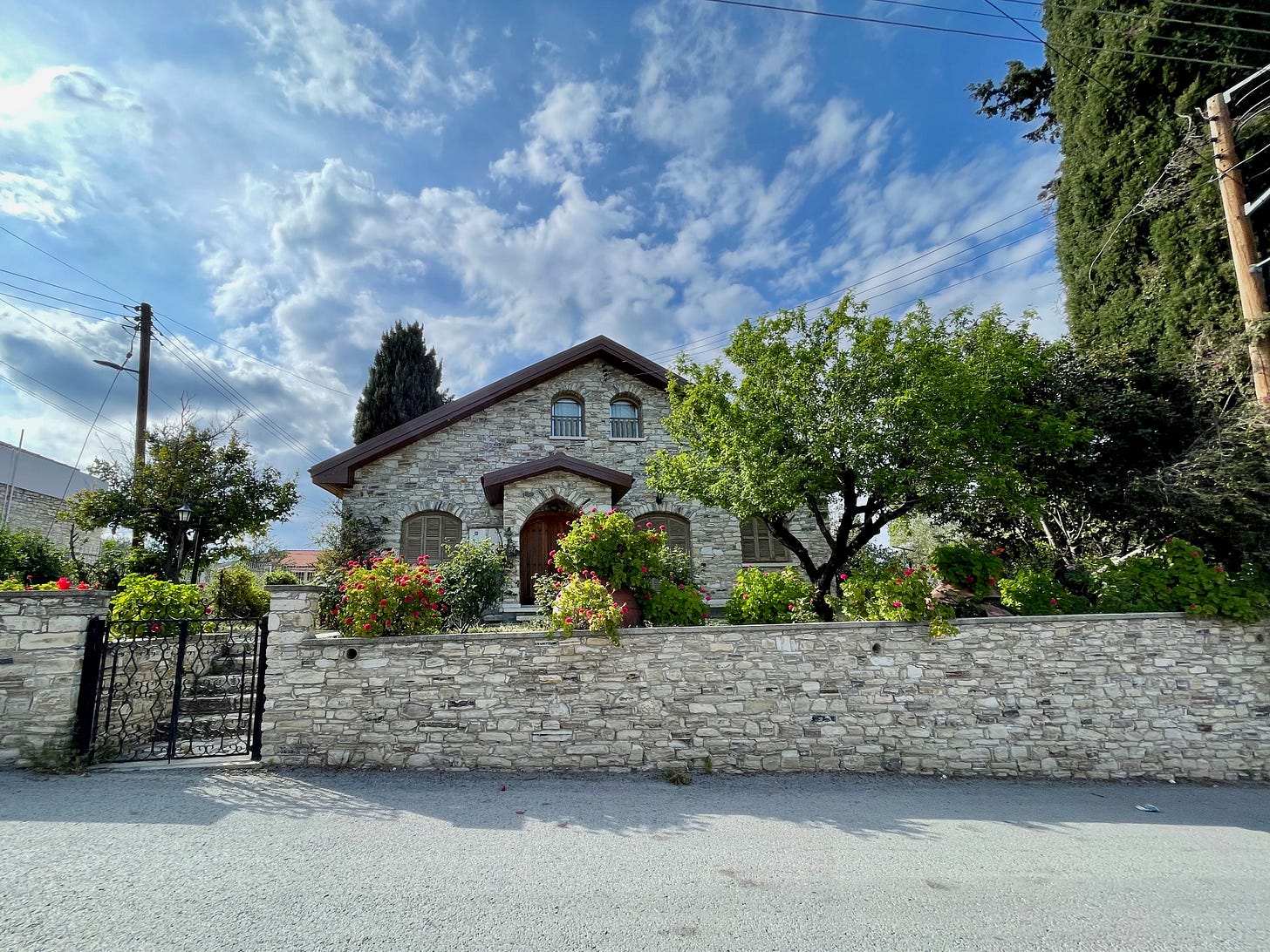



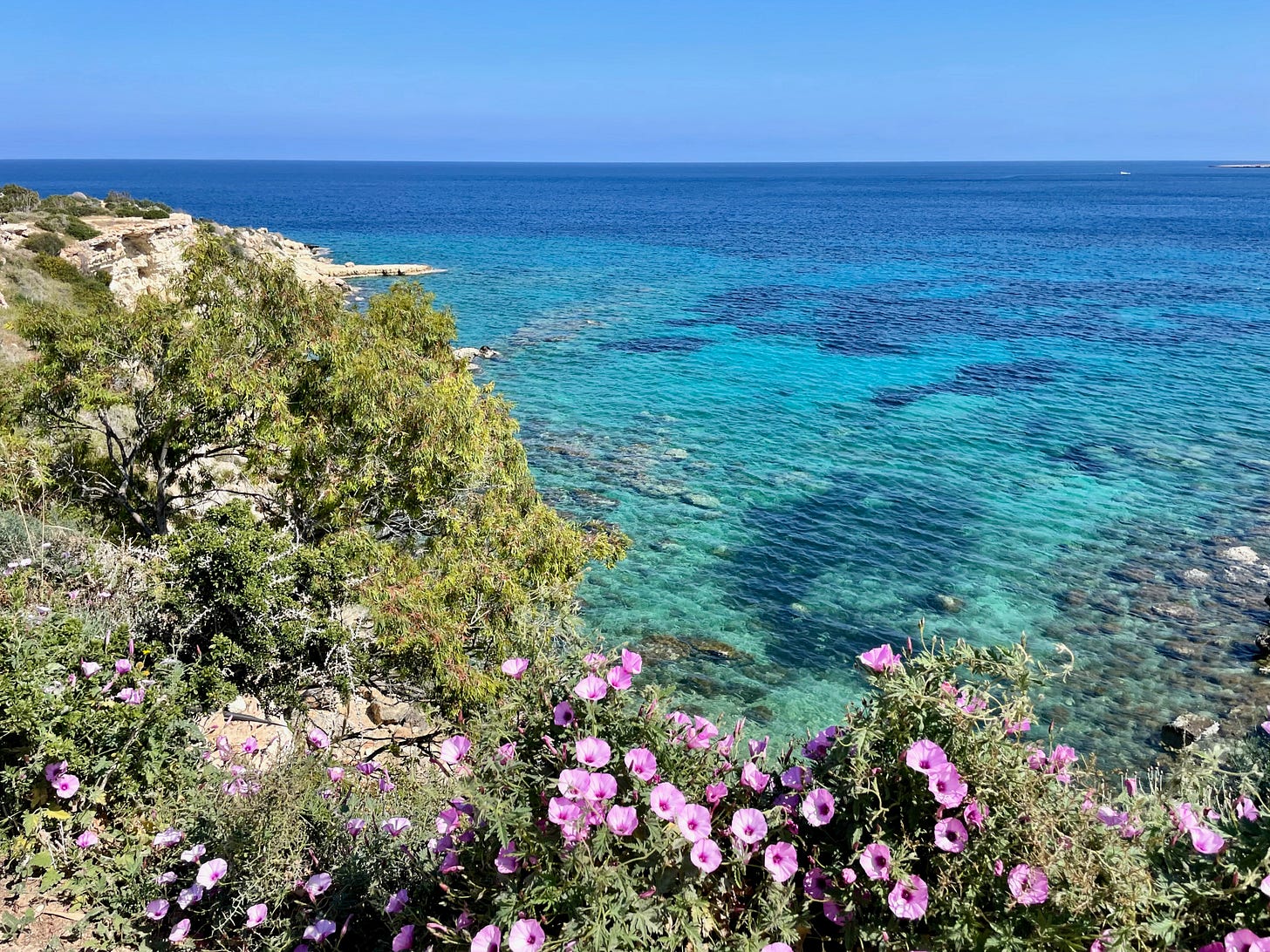
One thing I came to think of as I read this is the inner journey that takes place when traveling. We might be in a breathtaking location and barely see it because of the storm inside our minds. Or we might be in an ugly location and spot something beautiful because our mind is open and ready to take in impressions.
Thank you for sharing such a personal journey and story.
Thanks for another beautiful and moving post, Sam! I can relate to the feeling that anniversaries of those we've lost can feel both meaningful and arbitrary. The metaphor of borders is just perfect, especially when the loss is new. Death and the grief lead us into strange places filled with both dark and light. I think you capture some of both. I also am now very interested in learning more about Cyprus!